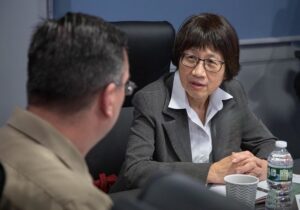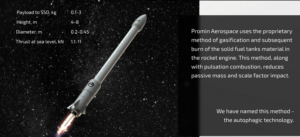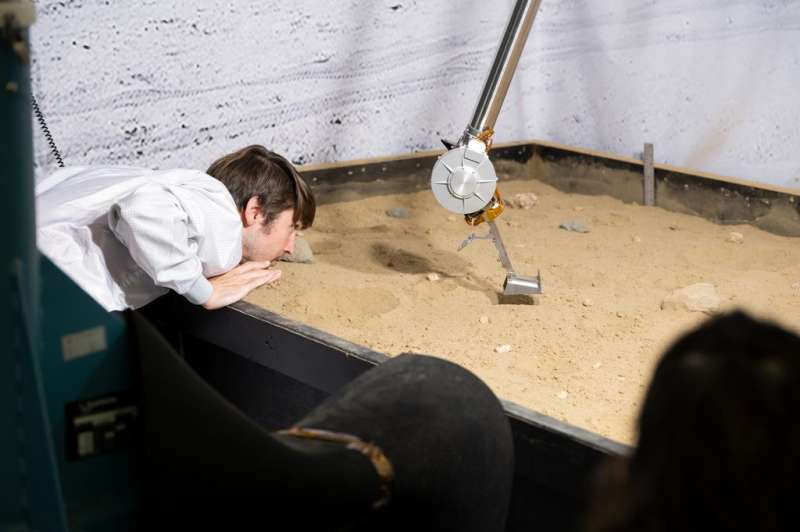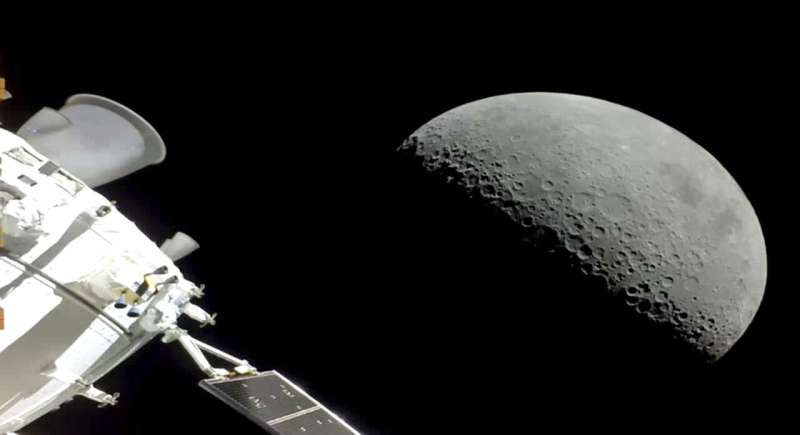Giant mantle plume reveals Mars is more active than previously thought
Tuesday, 06 December 2022 01:23 On Earth, shifting tectonic plates reshuffle the planet's surface and make for a dynamic interior, so the absence of such processes on Mars led many to think of it as a dead planet, where not much happened in the past 3 billion years.
In the current issue of Nature Astronomy, scientists from the University of Arizona challenge current views of Martian geodynamic evolution with a report on
On Earth, shifting tectonic plates reshuffle the planet's surface and make for a dynamic interior, so the absence of such processes on Mars led many to think of it as a dead planet, where not much happened in the past 3 billion years.
In the current issue of Nature Astronomy, scientists from the University of Arizona challenge current views of Martian geodynamic evolution with a report on Methods for building lunar landing pads may involve microwaving moon soil
Tuesday, 06 December 2022 01:23Plant on China's Shenzhou-15 spaceship begins growing
Tuesday, 06 December 2022 01:23 The Arabidopsis thaliana plant boarding on China's Shenzhou-15 manned spaceship has begun growing, the China Science and Technology Daily reported on Monday.
The Shenzhou-15 spaceship was launched at 11:08 p.m. on Nov. 29, 2022. About 20 hours later, Chinese astronauts placed the Arabidopsis thaliana in a biological incubator in the life and ecological experiment cabinet inside the Wentian
The Arabidopsis thaliana plant boarding on China's Shenzhou-15 manned spaceship has begun growing, the China Science and Technology Daily reported on Monday.
The Shenzhou-15 spaceship was launched at 11:08 p.m. on Nov. 29, 2022. About 20 hours later, Chinese astronauts placed the Arabidopsis thaliana in a biological incubator in the life and ecological experiment cabinet inside the Wentian Second Time's the Charm: Sols 3671-3673
Tuesday, 06 December 2022 01:23 As happens occasionally, our previous plan did not execute quite as expected. There was an issue with the rover's avionics in Wednesday's plan just before MAHLI was to take images of our contact science target "Roxinho." This precluded that imaging, the subsequent drive and observations taken from our remote sensing mast. Thankfully our engineering team here at JPL assessed the fault and felt co
As happens occasionally, our previous plan did not execute quite as expected. There was an issue with the rover's avionics in Wednesday's plan just before MAHLI was to take images of our contact science target "Roxinho." This precluded that imaging, the subsequent drive and observations taken from our remote sensing mast. Thankfully our engineering team here at JPL assessed the fault and felt co Impact-induced formation of microscopic magnetite first confirmed in Chang'E-5 lunar soil
Tuesday, 06 December 2022 01:23 A research team led by Prof. LI Yang and Dr. GUO Zhuang from the Institute of Geochemistry of the Chinese Academy of Sciences (IGCAS) conducted in-situ electron microanalysis of spherical iron-sulfide grains in the finest Chang'E-5 lunar soil and has confirmed the presence of impact-induced sub-microscopic magnetite.
The study was published in Nature Communications on Nov. 23.
Magnet
A research team led by Prof. LI Yang and Dr. GUO Zhuang from the Institute of Geochemistry of the Chinese Academy of Sciences (IGCAS) conducted in-situ electron microanalysis of spherical iron-sulfide grains in the finest Chang'E-5 lunar soil and has confirmed the presence of impact-induced sub-microscopic magnetite.
The study was published in Nature Communications on Nov. 23.
Magnet Sierra Space selected by Maxar to provide solar power solutions for constellation of proliferated LEO satellites
Tuesday, 06 December 2022 01:23 Sierra Space, a leading space company building an end-to-end business and technology platform in space to benefit life on Earth, reports that the company won a significant space defense contract with Maxar. Under the agreement, Sierra Space will provide revolutionary solar power solutions and production capability.
This contract will support a constellation of 14 satellites that use Maxar'
Sierra Space, a leading space company building an end-to-end business and technology platform in space to benefit life on Earth, reports that the company won a significant space defense contract with Maxar. Under the agreement, Sierra Space will provide revolutionary solar power solutions and production capability.
This contract will support a constellation of 14 satellites that use Maxar' NASA's Roman Mission completes key optical components
Tuesday, 06 December 2022 01:23 Engineers at Ball Aerospace, one of the industrial partners for NASA's Nancy Grace Roman Space Telescope, have installed and aligned the element wheel assembly (pictured above) into the telescope's Wide Field Instrument. The assembly contains eight science filters, two dispersive elements (a grism and prism) and a "blank" element (used for internal calibration) that will help scientists solve so
Engineers at Ball Aerospace, one of the industrial partners for NASA's Nancy Grace Roman Space Telescope, have installed and aligned the element wheel assembly (pictured above) into the telescope's Wide Field Instrument. The assembly contains eight science filters, two dispersive elements (a grism and prism) and a "blank" element (used for internal calibration) that will help scientists solve so Cosmic ray counts hidden in spacecraft data highlight influence of solar cycle at Mars and Venus
Tuesday, 06 December 2022 01:23 Measurements by ESA's long-serving twin missions, Mars Express and Venus Express, have captured the dance between the intensity of high-energy cosmic rays and the influence of the Sun's activity across our inner Solar System.
A comparison of data from the ASPERA plasma sensor, an instrument carried by both spacecraft, with the number of sunspots visible on the surface of the Sun shows how
Measurements by ESA's long-serving twin missions, Mars Express and Venus Express, have captured the dance between the intensity of high-energy cosmic rays and the influence of the Sun's activity across our inner Solar System.
A comparison of data from the ASPERA plasma sensor, an instrument carried by both spacecraft, with the number of sunspots visible on the surface of the Sun shows how Terran Orbital assists demonstration of 1.4 Terabyte Single-Pass Optical Downlink for Pathfinder TD3 Satellite
Tuesday, 06 December 2022 01:23 Terran Orbital Corporation (NYSE: LLAP), a global leader in satellite-based solutions primarily serving the aerospace and defense industries, has announced its contribution to the successful demonstration of a record-breaking 1.4-terabytes of data delivered from space to ground by an optical downlink in a single pass.
The demonstration connected the TeraByte InfraRed Delivery (TBIRD) laser
Terran Orbital Corporation (NYSE: LLAP), a global leader in satellite-based solutions primarily serving the aerospace and defense industries, has announced its contribution to the successful demonstration of a record-breaking 1.4-terabytes of data delivered from space to ground by an optical downlink in a single pass.
The demonstration connected the TeraByte InfraRed Delivery (TBIRD) laser NOAA approves Maxar to provide non-earth imaging services to government and commercial customers
Tuesday, 06 December 2022 01:23 Maxar Technologies (NYSE:MAXR) (TSX:MAXR), provider of comprehensive space solutions and secure, precise, geospatial intelligence, has announced that the National Oceanic and Atmospheric Administration (NOAA) has modified Maxar's remote sensing license to enable the non-Earth imaging (NEI) capability for its current constellation on orbit as well as its next-generation WorldView Legion satellite
Maxar Technologies (NYSE:MAXR) (TSX:MAXR), provider of comprehensive space solutions and secure, precise, geospatial intelligence, has announced that the National Oceanic and Atmospheric Administration (NOAA) has modified Maxar's remote sensing license to enable the non-Earth imaging (NEI) capability for its current constellation on orbit as well as its next-generation WorldView Legion satellite Space Software provider Antaris announces launch readiness of world's first cloud-built demonstration satellite
Tuesday, 06 December 2022 01:23 Antaris, the software platform provider for space, says that the first-ever satellite fully conceived, designed and manufactured using the company's end-to-end software is ready for launch. Creation of the satellite, dubbed JANUS-1, involved eight organizations spanning seven countries collaborating virtually through the Antaris cloud-based platform, which features open APIs and core open source
Antaris, the software platform provider for space, says that the first-ever satellite fully conceived, designed and manufactured using the company's end-to-end software is ready for launch. Creation of the satellite, dubbed JANUS-1, involved eight organizations spanning seven countries collaborating virtually through the Antaris cloud-based platform, which features open APIs and core open source Advisory panel to examine DoD’s demand for commercial space systems
Monday, 05 December 2022 22:00
The Pentagon’s top research official has directed the Defense Science Board to examine the military’s growing reliance on commercial space technology and its implications.
The post Advisory panel to examine DoD’s demand for commercial space systems appeared first on SpaceNews.
Ukraine’s Promin Aerospace on track for 2023 flight test
Monday, 05 December 2022 21:39
Ukrainian startup Promin Aerospace remains on track to conduct the first test of its small satellite launch technology early next year, in spite of the ongoing Russian-Ukrainian war.
The post Ukraine’s Promin Aerospace on track for 2023 flight test appeared first on SpaceNews.
NASA is testing a new robotic arm that really knows how to chill out
Monday, 05 December 2022 20:07
Future planetary missions could explore in extremely cold temperatures that stymie existing spacecraft, thanks to a project under development at JPL.
When NASA returns to the moon with Artemis, the agency and its partners will reach unexplored regions of the lunar surface around the South Pole, where it can get much colder at night than even on frigid Mars.
NASA capsule flies over Apollo landing sites, heads home
Monday, 05 December 2022 20:03
NASA's Orion capsule and its test dummies swooped one last time around the moon Monday, flying over a couple Apollo landing sites before heading home.

